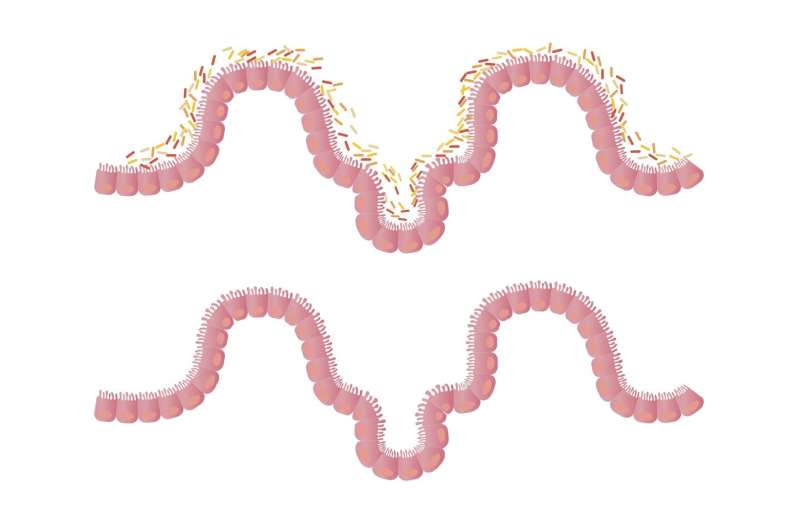This article has been reviewed according to Science X's editorial process and policies. Editors have highlighted the following attributes while ensuring the content's credibility:
fact-checked
peer-reviewed publication
trusted source
proofread
Enhanced gut microbiome diversity linked to improved survival in children receiving stem cell transplants

Researchers in Italy have shown for the first time that among children who have undergone a donor stem cell transplant, the presence of diverse species of micro-organisms in the intestinal tract before the transplant resulted in significantly better overall patient survival and fewer complications. The study, published in the journal Blood, adds to a growing body of research unraveling the role gut health plays in health outcomes.
"Our study provides the first evidence of a relationship between pre-transplant microbial diversity in the intestinal tract and post-transplant survival in children," said Riccardo Masetti, MD, Ph.D., of the Department of Pediatric Oncology and Hematology at the University of Bologna, Italy. "This finding suggests that interventions to improve microbial diversity before donor transplantation could help more children survive."
In both children and adults, transplantation of blood-forming cells from a matched donor (known as allogeneic stem cell transplantation) is a potential cure for many blood cancers, as well as for a variety of non-cancerous conditions. However, factors such as diet changes and pre-transplant treatment with antibiotics and chemotherapy can lead to a loss of gut microbiota diversity and increased levels of potentially infectious bacteria, which may contribute to many potentially life-threatening events like bloodstream infections and immune system complications.
Dr. Masetti and his colleagues analyzed stool samples collected from 90 pediatric patients before and during allogeneic stem cell transplants performed at three centers in Italy and one in Poland between 2013 and 2020. Patients' median age at the time of their transplant was nine; 59% were boys. More than half of the patients underwent the transplant to treat acute leukemia; the rest had other blood cancers or classical (non-malignant) blood diseases.
Patients were followed for a median of 52 months. After adjusting for patient age, type of disease, type of donor, type of pre-transplant treatment regimen, and the treatment center location, the estimated overall survival at 52 months was 88.9% for patients who had a higher diversity of gut microbiota before the transplant, compared with 62.7% for those with lower pre-transplant microbiota diversity.
Patients with higher microbiota diversity were also significantly less likely to experience acute graft-versus-host disease (aGVHD), which occurs when the donor cells attack and damage the patient's own healthy cells.
Researchers found the association between higher microbiota diversity and improved survival was similar regardless of whether patients were treated at one of the three centers in Italy or at the center in Poland, which may indicate that the association is independent of the disease or treatment location.
The human intestinal tract is home to trillions of microorganisms such as bacteria, viruses, and fungi. Collectively known as gut microbiota, these microorganisms perform vital health-related functions, such as protecting against infectious disease and helping the body absorb nutrients and energy from food.
Dr. Masetti and team said the next steps following the study findings should include assessing the specific effects of factors influencing the microbiota diversity (antibiotics and other drugs, diet, etc.) and intervention strategies aimed at modifying these factors.
Their findings have several limitations, he explained. While the study is the first and largest to examine the role of gut microbiota in children receiving donor stem cell transplants, the number of children studied was relatively small, patients were treated over a seven-year period for several different diseases and with pre-transplant drug regimens, and their transplants were performed with different techniques. Patients also ranged in age from infants to teenagers, and the role and behavior of gut microbiota may differ depending on age, Dr. Masetti said.
Despite these limitations, he said, "Our findings underscore the importance of pre-transplant gut microbiota diversity in influencing the outcomes of allogeneic stem-cell transplantation in children."
Larger prospective studies are needed to fully define the clinical significance of gut microbiota in determining outcomes in pediatric patients.



















